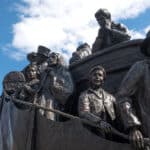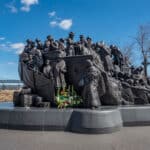Starvation
The Great Hunger in Ireland led to the greatest loss of life in western Europe in the 100 years between the Napoleonic Wars and World War I. Whole families and villages fell to starvation and accompanying diseases. Cholera, deadly fevers, dysentery, scurvy and typhus swept the population. People died in such great numbers that it was impossible to record all the deaths or to make enough coffins for burials.” Trap coffins,” which were made with a trap door in the bottom, were used for the trip to the cemetery. Once there, the coffin was placed over the grave and the trap door opened to drop the body into it, leaving the coffin ready for the next victim.
Tenants who were unable to pay the landlords found themselves evicted and their homes destroyed, so that they had no shelter as well as no food. The homeless, evicted from their small plots, died along the roadsides. Those arrested for taking food for their starving families could find themselves bound in chains on prison ships to Australia.
British government relief efforts were largely limited to establishing soup kitchens, poorhouses, and public works projects, which failed because they were too few and poorly managed. The main voluntary attempts to deal with the crisis, especially in the west of Ireland, were undertaken by The Religious Society of Friends (Quakers) whose organizers included William E. Foster and James Tuke. Philadelphia merchant, John Wanamaker, headed the Relief Committee and also contributed to the Friends’ effort from this country. Eight ships filled with provisions sailed from Philadelphia. Others who contributed to the relief efforts included the Choctaw Indian Nation and The Society of the Friendly Sons of Saint Patrick of Philadelphia.
Gone were the laughter of children at play, the cheerful greetings as one neighbor met another: “The famine silence, as it came to be called, seized the imagination of visitors and gave them a deeper feeling of the country’s devastation than anything else they encountered,” writes Thomas Gallagher, author of Paddy’s Lament. “It was,” he continues,” as if the entire country had become an open tomb, with voiceless specters moving about under a shattered sky whose thunder and rain alone made any sound.” Back…






